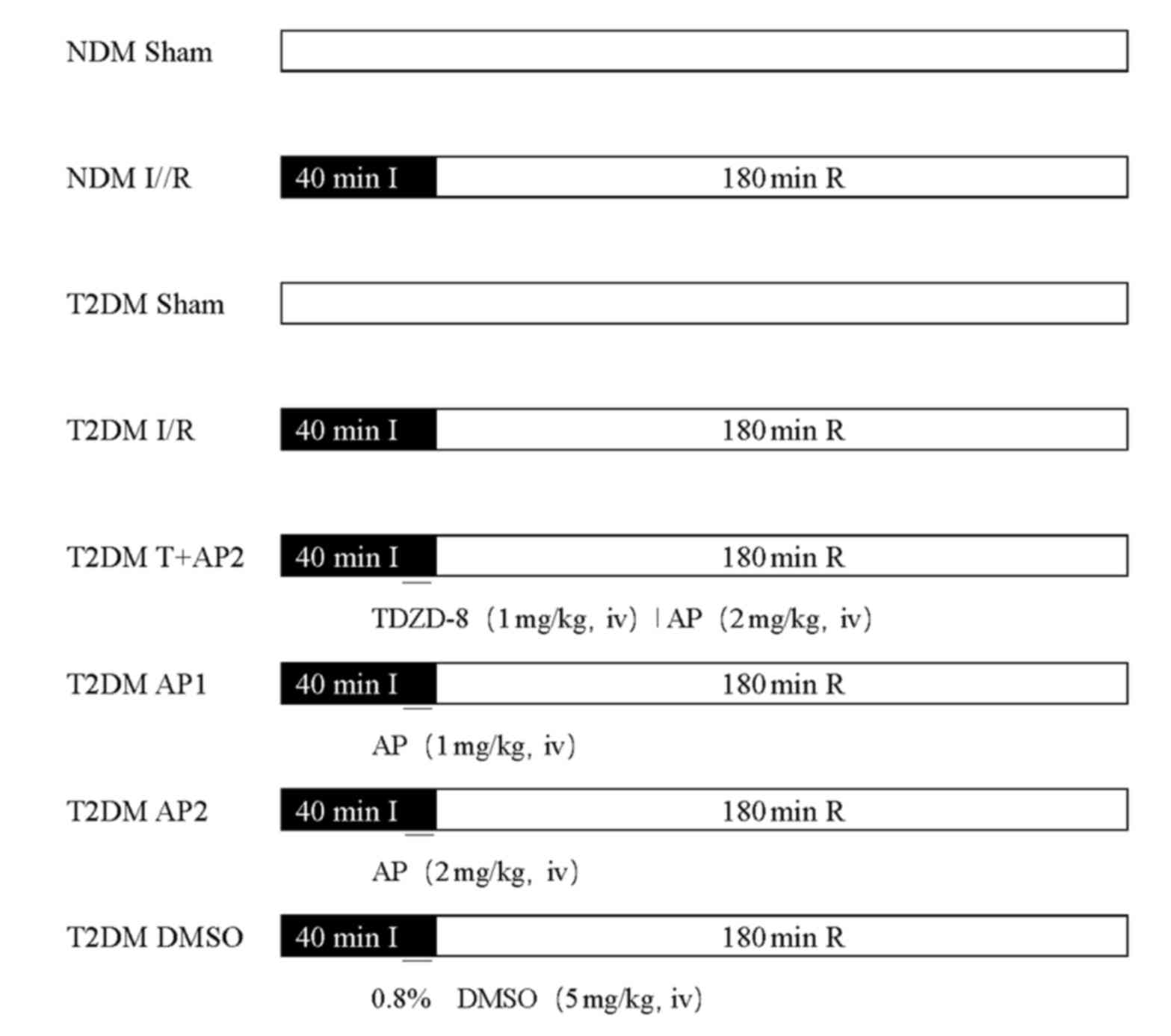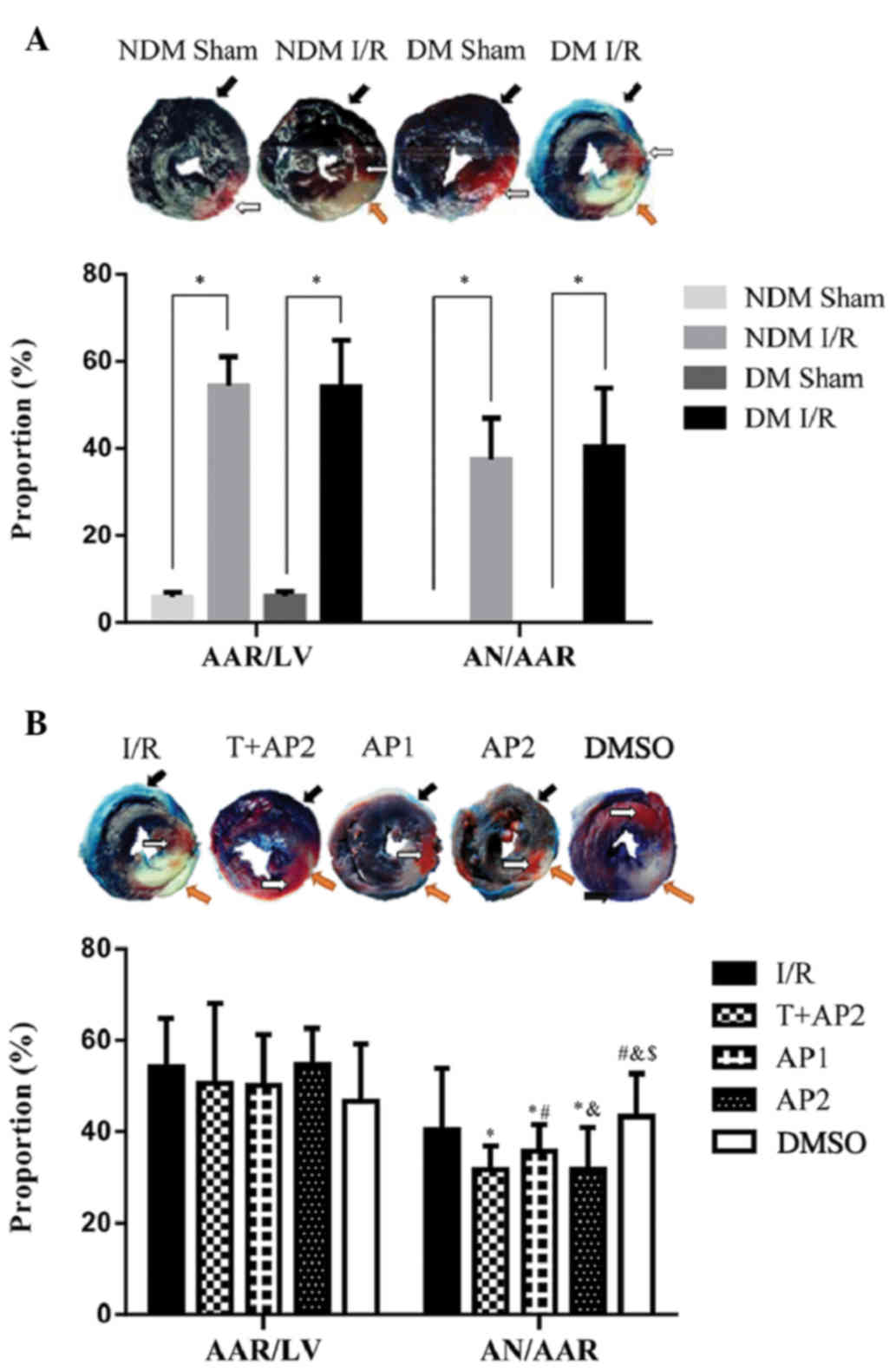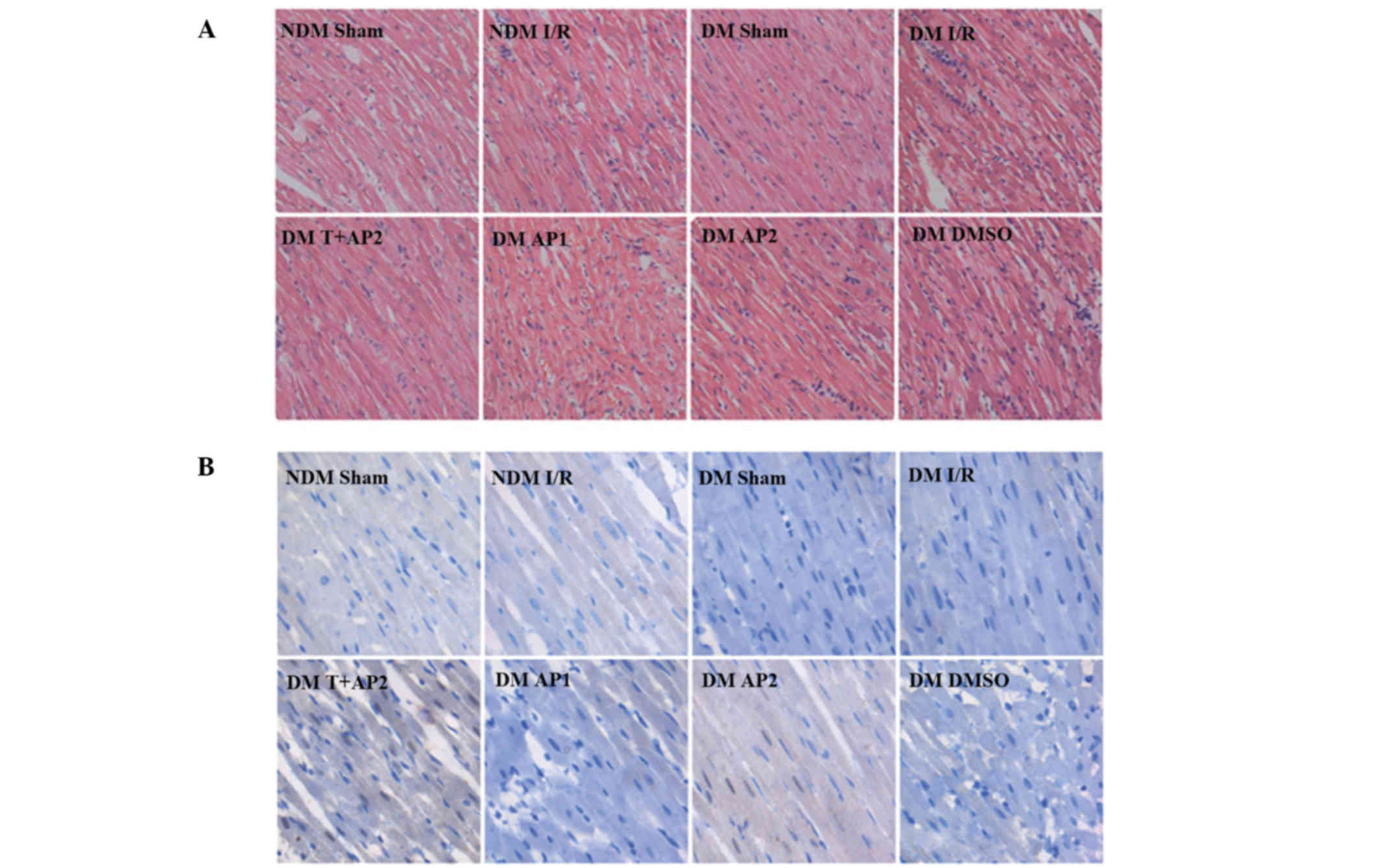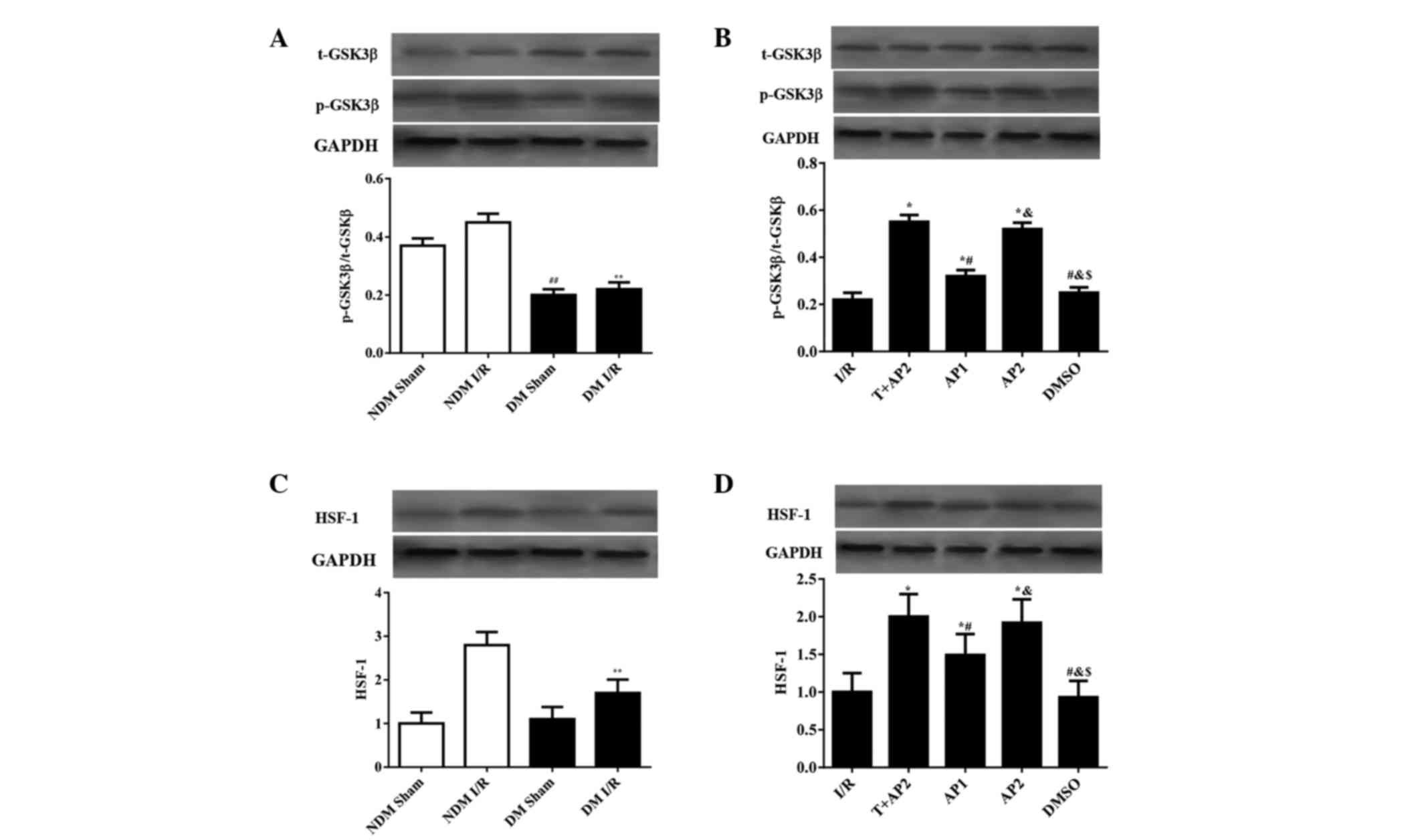|
1
|
Jennings RB, Sommers HM, Smyth GA, Flack
HA and Linn H: Myocardial necrosis induced by temporary occlusion
of a coronary artery in the dog. Arch Pathol. 70:68–78.
1960.PubMed/NCBI
|
|
2
|
Yellon DM and Hausenloy DJ: Myocardial
reperfusion injury. N Engl J Med. 357:1121–1135. 2007. View Article : Google Scholar : PubMed/NCBI
|
|
3
|
Moore RM, Muir WW, Bertone AL, Beard WL
and Stromberg PC: Effects of dimethyl sulfoxide, allopurinol,
21-aminosteroid U-74389G, and manganese chloride on low-flow
ischemia and reperfusion of the large colon in horses. Am J Vet
Res. 56:671–687. 1995.PubMed/NCBI
|
|
4
|
Meng X, Brown JM, Ao L, Banerjee A and
Harken AH: Norepinephrine induces cardiac heat shock protein 70 and
delayed cardioprotection in the rat through alpha 1 adrenoceptors.
Cardiovasc Res. 32:374–383. 1996. View Article : Google Scholar : PubMed/NCBI
|
|
5
|
Horne MM, Pascoe PJ, Ducharme NG, Barker
IK and Grovum WL: Attempts to modify reperfusion injury of equine
jejunal mucosa using dimethylsulfoxide, allopurinol, and
intraluminal oxygen. Vet Surg. 23:241–249. 1994. View Article : Google Scholar : PubMed/NCBI
|
|
6
|
Okubo S, Wildner O, Shah MR, Chelliah JC,
Hess ML and Kukreja RC: Gene transfer of heat-shock protein 70
reduces infarct size in vivo after ischemia/reperfusion in the
rabbit heart. Circulation. 103:877–881. 2001. View Article : Google Scholar : PubMed/NCBI
|
|
7
|
Marfella R, D'Amico M, Di Filippo C,
Piegari E, Nappo F, Esposito K, Berrino L, Rossi F and Giugliano D:
Myocardial infarction in diabetic rats: role of hyperglycaemia on
infarct size and early expression of hypoxia-inducible factor 1.
Diabetologia. 45:1172–1181. 2002. View Article : Google Scholar : PubMed/NCBI
|
|
8
|
Zhao ZQ, Corvera JS, Halkos ME, Kerendi F,
Wang NP, Guyton RA and Vinten-Johansen J: Inhibition of myocardial
injury by ischemic postconditioning during reperfusion: comparison
with ischemic preconditioning. Am J Physiol Heart Circ Physiol.
285:H579–H588. 2003. View Article : Google Scholar : PubMed/NCBI
|
|
9
|
Ravingerová T, Neckár J and Kolár F:
Ischemic tolerance of rat hearts in acute and chronic phases of
experimental diabetes. Mol Cell Biochem. 249:167–174. 2003.
View Article : Google Scholar : PubMed/NCBI
|
|
10
|
Kin H: Postconditioning attenuates
myocardial ischemia-reperfusion injury by inhibiting events in the
early minutes of reperfusion. Cardiovasc Res. 62:74–85. 2004.
View Article : Google Scholar : PubMed/NCBI
|
|
11
|
Marfella R, Di Filippo C, Esposito K,
Nappo F, Piegari E, Cuzzocrea S, Berrino L, Rossi F, Giugliano D
and D'Amico M: Absence of inducible nitric oxide synthase reduces
myocardial damage during ischemia reperfusion in
streptozotocin-induced hyperglycemic mice. Diabetes. 53:454–462.
2004. View Article : Google Scholar : PubMed/NCBI
|
|
12
|
Di Filippo C, Marfella R, Cuzzocrea S,
Piegari E, Petronella P, Giugliano D, Rossi F and D'Amico M:
Hyperglycemia in streptozotocin-induced diabetic rat increases
infarct size associated with low levels of myocardial HO-1 during
ischemia/reperfusion. Diabetes. 54:803–810. 2005. View Article : Google Scholar : PubMed/NCBI
|
|
13
|
Lowenstein CJ: Myocardial reperfusion
injury. N Engl J Med. 357:2409, 2409–2410. 2007.
|
|
14
|
Crunkhorn S: Cardiovascular drugs:
Engineered apyrase averts clot formation. Nat Rev Drug Discov.
13:724–725. 2014. View
Article : Google Scholar : PubMed/NCBI
|
|
15
|
Lund SS: Ischaemic conditioning for
myocardial salvage after AMI. Lancet. 375:1691–1692. 2010.
View Article : Google Scholar : PubMed/NCBI
|
|
16
|
Meybohm P, Bein B, Brosteanu O, Cremer J,
Gruenewald M, Stoppe C, Coburn M, Schaelte G, Böning A, Niemann B
and Roesner J: A multicenter trial of remote ischemic
preconditioning for heart surgery. N Engl J Med. 373:1397–1407.
2015. View Article : Google Scholar : PubMed/NCBI
|
|
17
|
Hausenloy DJ and Yellon DM: Targeting
myocardial reperfusion injury - The search continues. N Engl J Med.
373:1073–1075. 2015. View Article : Google Scholar : PubMed/NCBI
|
|
18
|
Cung TT, Morel O, Cayla G, Rioufol G,
Garcia-Dorado D, Angoulvant D, Bonnefoy-Cudraz E, Guérin P, Elbaz
M, Delarche N and Coste P: Cyclosporine before PCI in patients with
acute myocardial infarction. N Engl J Med. 373:1021–1031.
2015.PubMed/NCBI
|
|
19
|
Keeley EC, Boura JA and Grines CL: Primary
angioplasty versus intravenous thrombolytic therapy for acute
myocardial infarction: a quantitative review of 23 randomised
trials. Lancet. 361:13–20. 2003. View Article : Google Scholar : PubMed/NCBI
|
|
20
|
Boston DR, Malouf A and Barry WH:
Management of intracoronary thrombosis complicating percutaneous
transluminal coronary angioplasty. Clin Cardiol. 19:536–542. 1996.
View Article : Google Scholar : PubMed/NCBI
|
|
21
|
Tissier R, Waintraub X, Couvreur N,
Gervais M, Bruneval P, Mandet C, Zini R, Enriquez B, Berdeaux A and
Ghaleh B: Pharmacological postconditioning with the phytoestrogen
genistein. J Mol Cell Cardiol. 42:79–87. 2007. View Article : Google Scholar : PubMed/NCBI
|
|
22
|
Nicholls SJ, Brewer HB, Kastelein JJ,
Krueger KA, Wang MD, Shao M, Hu B, McErlean E and Nissen SE:
Effects of the CETP inhibitor evacetrapib administered as
monotherapy or in combination with statins on HDL and LDL
cholesterol: A randomized controlled trial. JAMA. 306:2099–2109.
2011. View Article : Google Scholar : PubMed/NCBI
|
|
23
|
Jones SP, Gibson MF, Rimmer DR, Gibson TM,
Sharp BR and Lefer DJ: Direct vascular and cardioprotective effects
of rosuvastatin, a new HMG-CoA reductase inhibitor. J Am Coll
Cardiol. 40:1172–1178. 2002. View Article : Google Scholar : PubMed/NCBI
|
|
24
|
Heart Protection Study Collaborative
Group, . MRC/BHF Heart Protection Study of cholesterol lowering
with simvastatin in 20,536 high-risk individuals: A randomised
placebo-controlled trial. Lancet. 360:7–22. 2002. View Article : Google Scholar : PubMed/NCBI
|
|
25
|
Ueda Y, Kitakaze M, Komamura K, Minamino
T, Asanuma H, Sato H, Kuzuya T, Takeda H and Hori M: Pravastatin
restored the infarct size-limiting effect of ischemic
preconditioning blunted by hypercholesterolemia in the rabbit model
of myocardial infarction. J Am Coll Cardiol. 34:2120–2125. 1999.
View Article : Google Scholar : PubMed/NCBI
|
|
26
|
Ludman A, Venugopal V, Yellon DM and
Hausenloy DJ: Statins and cardioprotection - more than just lipid
lowering? Pharmacol Ther. 122:30–43. 2009. View Article : Google Scholar : PubMed/NCBI
|
|
27
|
Liao JK and Laufs U: Pleiotropic effects
of statins. Annu Rev Pharmacol Toxicol. 45:89–118. 2005. View Article : Google Scholar : PubMed/NCBI
|
|
28
|
Nahrendorf M, Sosnovik D, Chen JW, Panizzi
P, Figueiredo JL, Aikawa E, Libby P, Swirski FK and Weissleder R:
Activatable magnetic resonance imaging agent reports
myeloperoxidase activity in healing infarcts and noninvasively
detects the antiinflammatory effects of atorvastatin on
ischemia-reperfusion injury. Circulation. 117:1153–1160. 2008.
View Article : Google Scholar : PubMed/NCBI
|
|
29
|
Birnbaum Y, Ye Y, Rosanio S, Tavackoli S,
Hu ZY, Schwarz ER and Uretsky BF: Prostaglandins mediate the
cardioprotective effects of atorvastatin against
ischemia-reperfusion injury. Cardiovasc Res. 65:345–355. 2005.
View Article : Google Scholar : PubMed/NCBI
|
|
30
|
Xu G, Takashi E, Kudo M, Ishiwata T and
Naito Z: Contradictory effects of short- and long-term
hyperglycemias on ischemic injury of myocardium via intracellular
signaling pathway. Exp Mol Pathol. 76:57–65. 2004. View Article : Google Scholar : PubMed/NCBI
|
|
31
|
Gomez L, Paillard M, Thibault H, Derumeaux
G and Ovize M: Inhibition of GSK3beta by postconditioning is
required to prevent opening of the mitochondrial permeability
transition pore during reperfusion. Circulation. 117:2761–2768.
2008. View Article : Google Scholar : PubMed/NCBI
|
|
32
|
Bopassa JC, Michel P, Gateau-Roesch O,
Ovize M and Ferrera R: Low-pressure reperfusion alters
mitochondrial permeability transition. Am J Physiol Heart Circ
Physiol. 288:H2750–H2755. 2005. View Article : Google Scholar : PubMed/NCBI
|
|
33
|
Nishihara M, Miura T, Miki T, Sakamoto J,
Tanno M, Kobayashi H, Ikeda Y, Ohori K, Takahashi A and Shimamoto
K: Erythropoietin affords additional cardioprotection to
preconditioned hearts by enhanced phosphorylation of glycogen
synthase kinase-3beta. AJP: Heart and Circulatory Physiology.
291:H748–H755. 2006.
|
|
34
|
Gao H, Yin Z, Zhou N, Feng X, Gao F and
Wang H: Glycogen synthase kinase 3 inhibition protects the heart
from acute ischemia-reperfusion injury via inhibition of
inflammation and apoptosis. J Cardiovasc Pharm. 52:286–292. 2008.
View Article : Google Scholar
|
|
35
|
Booth EA, Obeid NR and Lucchesi BR:
Activation of estrogen receptor- protects the in vivo rabbit heart
from ischemia-reperfusion injury. AJP: Heart and Circulatory
Physiology. 289:H2039–H2047. 2005.
|
|
36
|
Miki T, Itoh T, Sunaga D and Miura T:
Effects of diabetes on myocardial infarct size and cardioprotection
by preconditioning and postconditioning. Cardiovasc Diabetol.
11:672012. View Article : Google Scholar : PubMed/NCBI
|
|
37
|
Wang T, Qiao S, Lei S, Liu Y, Ng KF, Xu A,
Lam KS, Irwin MG and Xia Z: N-acetylcysteine and allopurinol
synergistically enhance cardiac adiponectin content and reduce
myocardial reperfusion injury in diabetic rats. PLoS One.
6:e239672011. View Article : Google Scholar : PubMed/NCBI
|
|
38
|
Miki T, Miura T, Hotta H, Tanno M, Yano T,
Sato T, Terashima Y, Takada A, Ishikawa S and Shimamoto K:
Endoplasmic reticulum stress in diabetic hearts abolishes
erythropoietin-induced myocardial protection by impairment of
phospho-glycogen synthase kinase-3-mediated suppression of
mitochondrial permeability transition. Diabetes. 58:2863–2872.
2009. View Article : Google Scholar : PubMed/NCBI
|
|
39
|
Jope RS and Johnson GVW: The glamour and
gloom of glycogen synthase kinase-3. Trends Biochem Sci. 29:95–102.
2004. View Article : Google Scholar : PubMed/NCBI
|
|
40
|
Jope RS, Yuskaitis CJ and Beurel E:
Glycogen synthase kinase-3 (GSK3): Inflammation, diseases, and
therapeutics. Neurochem Res. 32:577–595. 2007. View Article : Google Scholar : PubMed/NCBI
|
|
41
|
Ma G, Al-Shabrawey M, Johnson JA, Datar R,
Tawfik HE, Guo D, Caldwell RB and Caldwell RW: Protection against
myocardial ischemia/reperfusion injury by short-term diabetes:
enhancement of VEGF formation, capillary density, and activation of
cell survival signaling. Naunyn Schmiedebergs Arch Pharmacol.
373:415–427. 2006. View Article : Google Scholar : PubMed/NCBI
|
|
42
|
Embi N, Rylatt DB and Cohen P: Glycogen
synthase kinase-3 from rabbit skeletal muscle. Separation from
cyclic-AMP-dependent protein kinase and phosphorylase kinase. Eur J
Biochem. 107:519–527. 1980. View Article : Google Scholar : PubMed/NCBI
|
|
43
|
Cohen P and Goedert M: GSK3 inhibitors:
development and therapeutic potential. Nat Rev Drug Discov.
3:479–487. 2004. View Article : Google Scholar : PubMed/NCBI
|
|
44
|
Juhaszova M, Zorov DB, Kim SH, Pepe S, Fu
Q, Fishbein KW, Ziman BD, Wang S, Ytrehus K, Antos CL, et al:
Glycogen synthase kinase-3beta mediates convergence of protection
signaling to inhibit the mitochondrial permeability transition
pore. J Clin Invest. 113:1535–1549. 2004. View Article : Google Scholar : PubMed/NCBI
|
|
45
|
Mora A, Sakamoto K, McManus EJ and Alessi
DR: Role of the PDK1-PKB-GSK3 pathway in regulating glycogen
synthase and glucose uptake in the heart. FEBS Lett. 579:3632–3638.
2005. View Article : Google Scholar : PubMed/NCBI
|
|
46
|
Sugden PH, Fuller SJ, Weiss SC and Clerk
A: Glycogen synthase kinase 3 (GSK3) in the heart: A point of
integration in hypertrophic signalling and a therapeutic target? A
critical analysis. Br J Pharmacol. 153 Suppl 1:S137–S153. 2008.
View Article : Google Scholar : PubMed/NCBI
|
|
47
|
Haworth RA and Hunter DR: The Ca2+-induced
membrane transition in mitochondria. II. Nature of the Ca2+ trigger
site. Arch Biochem Biophys. 195:460–467. 1979. View Article : Google Scholar : PubMed/NCBI
|
|
48
|
Halestrap AP: A pore way to die: The role
of mitochondria in reperfusion injury and cardioprotection. Biochem
Soc Trans. 38:841–860. 2010. View Article : Google Scholar : PubMed/NCBI
|
|
49
|
Lagranha CJ, Deschamps A, Aponte A,
Steenbergen C and Murphy E: Sex differences in the phosphorylation
of mitochondrial proteins result in reduced production of reactive
oxygen species and cardioprotection in females. Circ Res.
106:1681–1691. 2010. View Article : Google Scholar : PubMed/NCBI
|
|
50
|
Lee KH, Jeong J and Yoo CG: Positive
feedback regulation of heat shock protein 70 (Hsp70) is mediated
through Toll-like receptor 4-PI3K/Akt-glycogen synthase
kinase-3beta pathway. Exp Cell Res. 319:88–95. 2013. View Article : Google Scholar : PubMed/NCBI
|
|
51
|
Nayeem MA, Hess ML, Qian YZ, Loesser KE
and Kukreja RC: Delayed preconditioning of cultured adult rat
cardiac myocytes: role of 70- and 90-kDa heat stress proteins. Am J
Physiol. 273:H861–H868. 1997.PubMed/NCBI
|
|
52
|
Jayakumar J, Suzuki K, Khan M, Smolenski
RT, Farrell A, Latif N, Raisky O, Abunasra H, Sammut IA, Murtuza B,
et al: Gene therapy for myocardial protection: transfection of
donor hearts with heat shock protein 70 gene protects cardiac
function against ischemia-reperfusion injury. Circulation.
102:I302–I306. 2000. View Article : Google Scholar
|
|
53
|
Son TW, Yun SP, Yong MS, Seo BN, Ryu JM,
Youn HY, Oh YM and Han HJ: Netrin-1 protects hypoxia-induced
mitochondrial apoptosis through HSP27 expression via DCC- and
integrin alpha6beta4-dependent Akt, GSK-3beta, and HSF-1 in
mesenchymal stem cells. Cell Death Dis. 4:e5632013. View Article : Google Scholar : PubMed/NCBI
|
|
54
|
Benjamin IJ and McMillan DR: Stress (heat
shock) proteins: molecular chaperones in cardiovascular biology and
disease. Circ Res. 83:117–132. 1998. View Article : Google Scholar : PubMed/NCBI
|
|
55
|
Dmitriev YV, Minasian SM, Demchenko EA and
Galagudza MM: Cardioprotective properties of dimethyl sulfoxide
during global ischemia-reperfusion of isolated rat heart. Bull Exp
Biol Med. 154:47–50. 2012. View Article : Google Scholar : PubMed/NCBI
|
|
56
|
de la Torre JC: Role of dimethyl sulfoxide
in prostaglandin-thromboxane and platelet systems after cerebral
ischemia. Ann N Y Acad Sci. 411:293–308. 1983. View Article : Google Scholar : PubMed/NCBI
|
|
57
|
Sahin M, Avsar FM, Ozel H, Topaloglu S,
Yılmaz B, Pasaoglu H, Avunduk MC, Erikoglu M and Hengirmen S: The
effects of dimethyl sulfoxide on liver damage caused by
ischemia-reperfusion. Transplant Proc. 36:pp. 2590–2592. 2004;
View Article : Google Scholar : PubMed/NCBI
|
|
58
|
Schoenberg MH and Beger HG: Oxygen
radicals in intestinal ischemia and reperfusion. Chem Biol
Interact. 76:141–161. 1990. View Article : Google Scholar : PubMed/NCBI
|
|
59
|
Punch J, Rees R, Cashmer B, Oldham K,
Wilkins E and Smith DJ: Acute lung injury following reperfusion
after ischemia in the hind limbs of rats. J Trauma. 31:760–765,
765-767. 1991. View Article : Google Scholar : PubMed/NCBI
|
|
60
|
Ergun Y, Koc A, Dolapcioglu K, Akaydin Y,
Dogruer G, Kontas T, Kozlu T and Aslan E: The protective effect of
erythropoietin and dimethylsulfoxide on ischemia-reperfusion injury
in rat ovary. Eur J Obstet Gynecol Reprod Biol. 152:186–190. 2010.
View Article : Google Scholar : PubMed/NCBI
|
|
61
|
Parisi A, Alfieri A, Mazzella M, Mazzella
A, Scognamiglio M, Scognamiglio G, Mascolo N and Cicala C:
Protective effect of dimethyl sulfoxide on acute myocardial
infarction in rats. J Cardiovasc Pharmacol. 55:106–109. 2010.
View Article : Google Scholar : PubMed/NCBI
|
|
62
|
Guimaraes SB, Kimura OS and Vasconcelos
PR: Dimethylsulfoxide attenuates ischemia-reperfusion injury in rat
testis. Acta Cir Bras. 25:357–361. 2010. View Article : Google Scholar : PubMed/NCBI
|
|
63
|
Weinstein PR, Hameroff SR, Johnson PC and
Anderson GG: Effect of hyperbaric oxygen therapy or dimethyl
sulfoxide on cerebral ischemia in unanesthetized gerbils.
Neurosurgery. 18:528–532. 1986. View Article : Google Scholar : PubMed/NCBI
|
|
64
|
Talukder MA, Yang F, Shimokawa H and
Zweier JL: eNOS is required for acute in vivo ischemic
preconditioning of the heart: effects of ischemic duration and sex.
Am J Physiol Heart Circ Physiol. 299:H437–H445. 2010. View Article : Google Scholar : PubMed/NCBI
|
|
65
|
Shinmura K, Nagai M, Tamaki K and Bolli R:
Gender and aging do not impair opioid-induced late preconditioning
in rats. Basic Res Cardiol. 99:46–55. 2004. View Article : Google Scholar : PubMed/NCBI
|



















